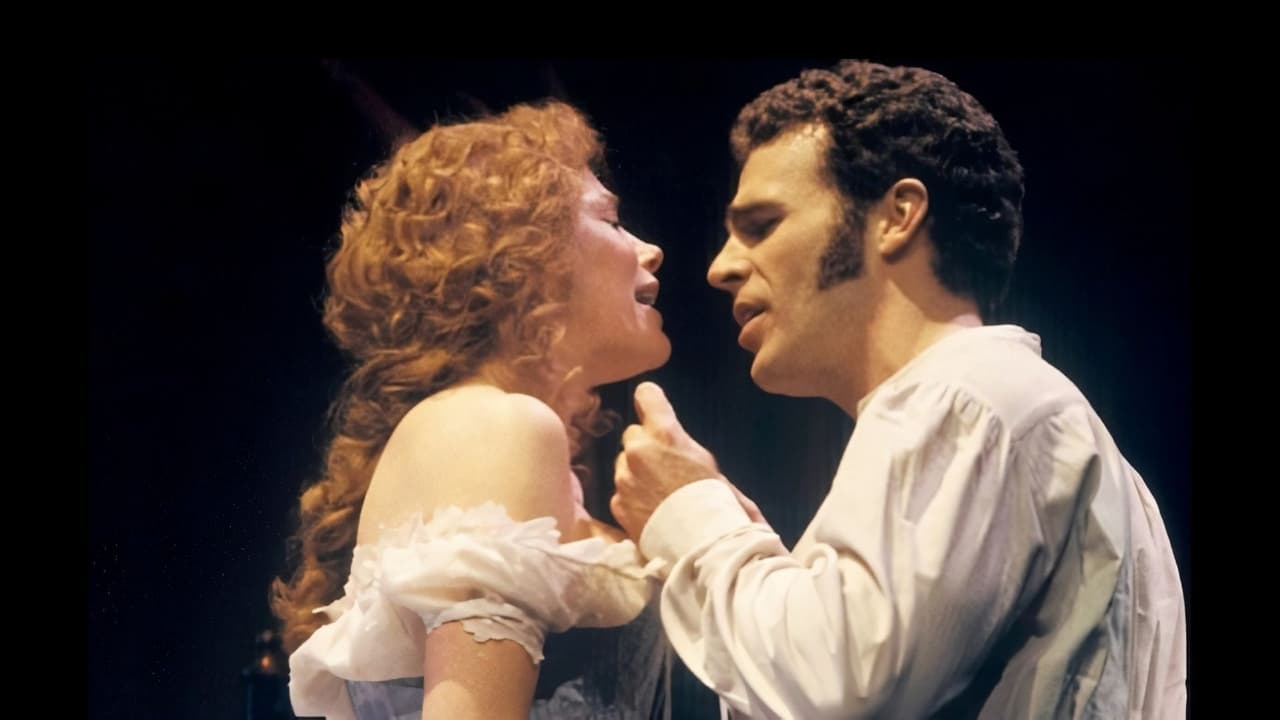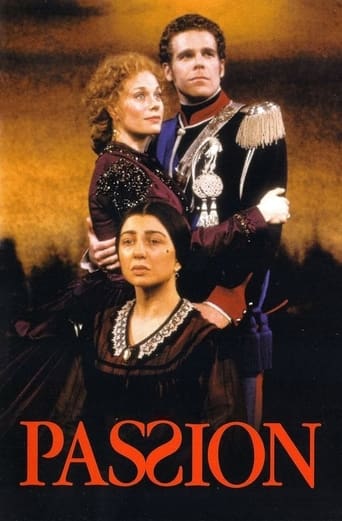



It's no definitive masterpiece but it's damn close.
View MoreI gave this film a 9 out of 10, because it was exactly what I expected it to be.
View MoreYes, absolutely, there is fun to be had, as well as many, many things to go boom, all amid an atmospheric urban jungle.
View MoreIt's a good bad... and worth a popcorn matinée. While it's easy to lament what could have been...
View MoreI'm giving this a pretty high score even though it's not the easiest to sit through. I just have too much respect for how it came across to me. Passion deserves to be talked about outside the niche within a niche of Sondheim fans. People who have seen this musical are likely to be repulsed, mainly because of the behavior of Fosca. Audiences shouted mean comments at the stage during preview performances! Why? Let's analyze the story.Giorgio, a green young man sent off to war, meets Fosca while stationed in a remote town. Fosca appears to suffer from mental illness, chronic physical illness, and eating disorders. Giorgio is the only person in the whole story who tries to know Fosca on her own terms and listen to her; no one finds her physically attractive. You can guess that she falls in love with Giorgio, but he is already involved with Clara, a married woman. Fosca is upfront, desperate and nosy about Giorgio and Clara. Giorgio is quick to call her out on it, insisting that her appearance is no excuse for her behavior. The trouble is, Fosca doesn't have anyone, and did I mention the self-esteem issues? We learn in a flashback that she was deceived by a suitor and brought up by her parents to believe that a woman's only value is in her beauty. Given what her life is like, I'd humor her a little more if I were Giorgio.Here's the thing: Giorgio denounces Fosca's infatuation as shallow and unreasonable, but his relationship with Clara is just that. We don't learn why he started seeing Clara. When we see Giorgio and Clara together, they do little other than make out, but in the bulk of his scenes with Fosca, he's talking and thinking with her. Fosca is more of an intellectual, being a reader and pianist, while Clara gives Giorgio permission to ignore her without having met her; unaware that no one sympathizes with Fosca a) because of her appearance, and b) from a lack of understanding of her medical condition!As you can tell, this is a thinker's piece. Passion is difficult to swallow, but it raises important questions. For one, where do we draw the line between pardoning antisocial behavior due to past suffering and total accountability? Is Fosca so defeated by society that there's no way she can't passive-aggressively harass the objects of her desire? (I say yes.) One could argue about this play endlessly, and to me, that is when you know a piece of writing or art has done its job.
View MoreThis has to be Sondheim's weakest work (with the possible exception of his last work, which I have never heard). As with most of his musicals, it suffers from a poor book (in fact, I think 'Forum' may be the only musical he wrote with a good book). But usually his work is saved by the wonderful music and lyrics. In this case both are dull, unimaginative, and even repetitive. Why on earth does he always take the worst material and try to turn it into a musical? In the past, it was crap like 'Merrily, We Roll Along' and 'Sweeney Todd'. He even managed to take one of the greatest films ever made, Smiles of Summer Night, and turned it into a trite, hackneyed, predictable story. But there we can blame the book writer for not staying true to the original material. Here he takes what was originally a highly mediocre Italian film and tries to turn it into something interesting. Well, he and Lapine once again failed at that. As to the performances, well they are all equally dull and uninteresting. Donna Murphy, in fact, belies the fragility of her character by belting out songs that could knock the walls off the theater. To say this is incongruous would be redundant. Jere Shea is just plain dull, and not very attractive. The rest of the cast is just plain dull. The direction, staging, costumes, lighting, etc. are all unimaginative. Hopefully this entire piece will just disappear from Sondheim's canon.
View MoreFor some reason there's no credit given here for the 1981 Italian film this musical is based on - Ruggero Maccari and Ettore Scola's "Passione d'amore" - which, in turn, was based on the novel "Fosca" by Iginio Ugo Tarchetti. All versions are well worth checking out! :)
View MoreThere's a number of different reactions that I can imagine a viewer could experience whilst watching this musical. My own was that of complete surrender to an intense and beautiful, if unlikely and dramatically heightened, story. But when a story is so stylised, when it is pushed as far to an extreme as possible, I feel that it can be permitted to go anywhere and twist *anything*. There is a line in Sondheim's PASSION goes, "Love that thinks everything is pure, everything is beautiful, everything is possible...," and this is precisely what we must understand before PASSION can make sense.The score in itself could accompany a ballet, wordless, and still be beautiful, I think (and I'm no huge fan of ballet). The lyrics are so fitting and right that they add yet another layer. I saw this filmed production about a year ago for the first time, before I listened to the album... but since then, I've become used to just listening to the 70 minute condensed version. Watching this again today reminded me just how amazing Donna Murphy is as Fosca, how stylised the whole show is visually, and simply of the value of *seeing* a work *intended* to be seen as well as heard, something a lot of musical fans can easily forget when access to professional productions can be so hard and expensive.Obviously there are those to whom this will not appeal. It asks you to believe in that entirely fictional kind of love, the kind that, if we ever *do* feel it, always feels false and embarrassing in retrospect. But Sondheim is better than any trash novel-writer and he deals with this ultimate extreme by pushing it even further so as to be so close to the ridiculous that it becomes something else entirely - the narrowminded might still laugh, but if you're prepared to risk going deeper, the investment is paid off. The actors in this production, particularly Donna Murphy, completely absorb themselves in their roles and truly give their all, the final scene between Fosca and Giorgio being perhaps one of the most intense, painful, and beautiful moments on the screen, merely from the exhausted, "hopelessly in love" expressions on both actors' faces. The movie is beautiful if you can find a way to let it in. You'll find yourself, in the end, seeing the movie's true beauty, repeating the movie's most profound line, "I don't know how I let you so far inside my mind, but there you are and there you will stay, how could I ever wish you away?"
View More